|
37 St Dunstan's Street
Canterbury
01227 634150
https://themonumentcanterbury.com/
https://whatpub.com/monument
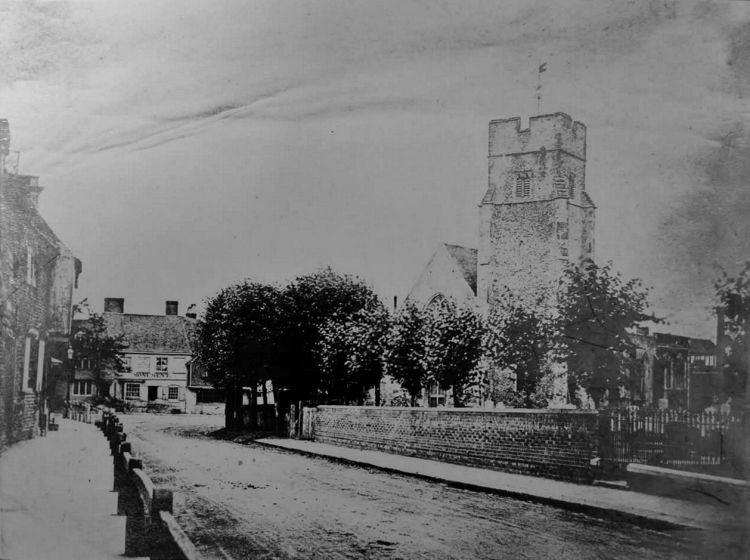
Above photo, circa 1850. |
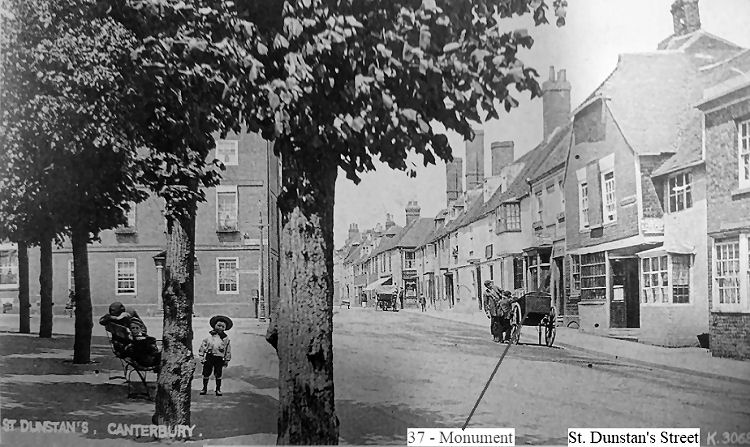
Above postcard 1910, kindly sent by Rory Kehoe. |
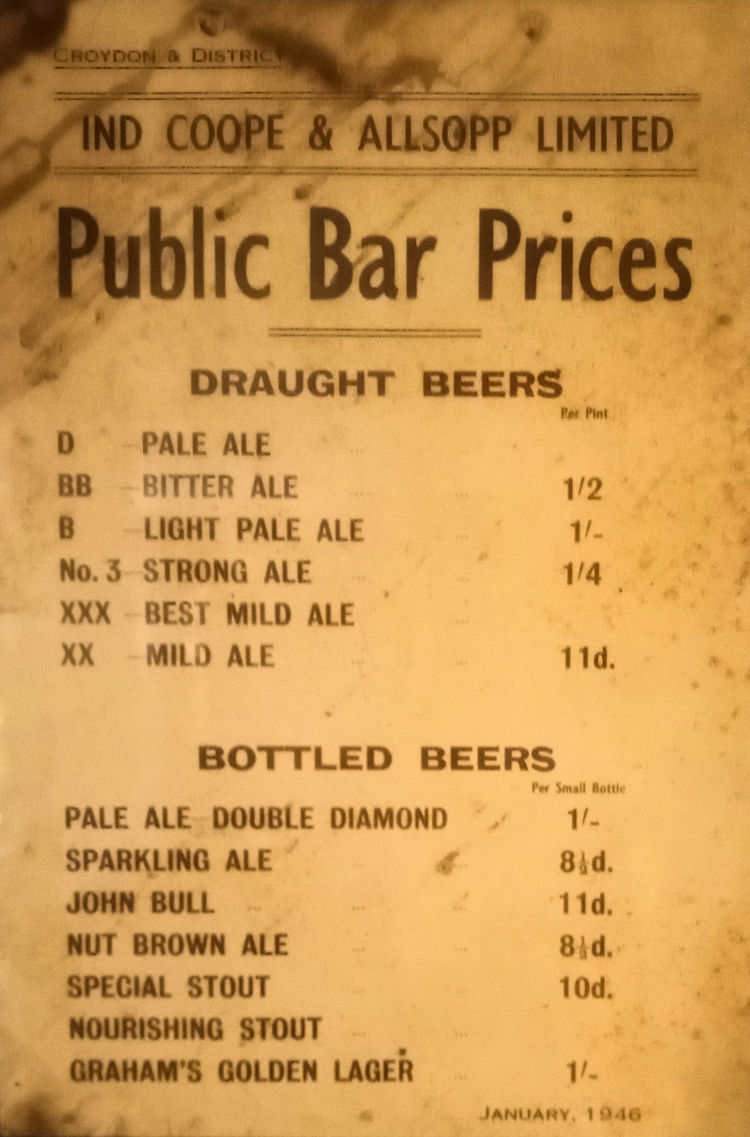
Above prices at the "Monument in 1946. Kindly sent by Rory Kehoe. This
Ind, Coope & Allsopp price list was found by Sam Holden, the current
owner/licensee of the "Monument" and is now displayed in the bar. The
Monument, which is now a successful free house, was never an Ind, Coope
& Allsopp pub, having previously been owned/supplied by Flint's, Leney's,
Fremlin's, Whitbread's and Shepherd Neame. Rather distressing to see, in
these days of £5 pints, that a 1946 pint of Light Pale Ale only cost
drinkers a mere shilling/5p! |
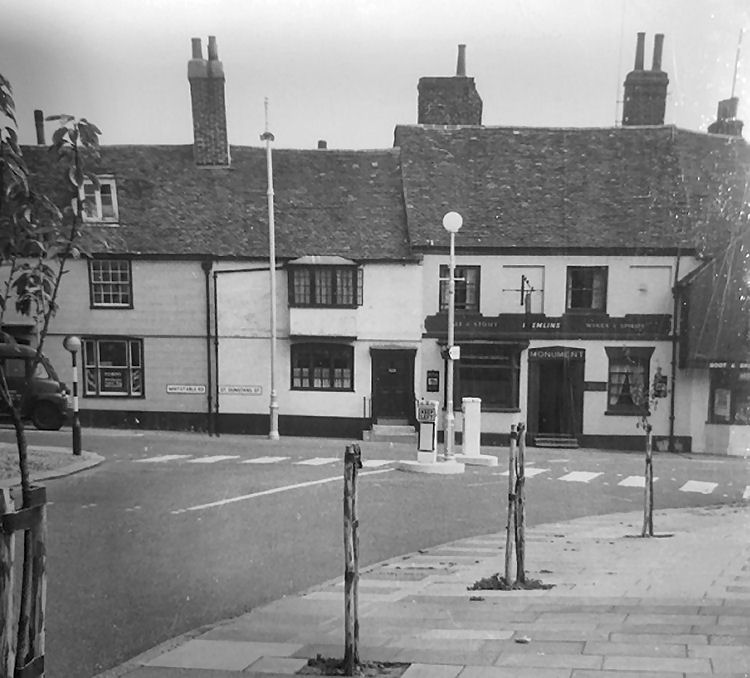
Above photo circa 1953, kindly sent by Rory Kehoe. |
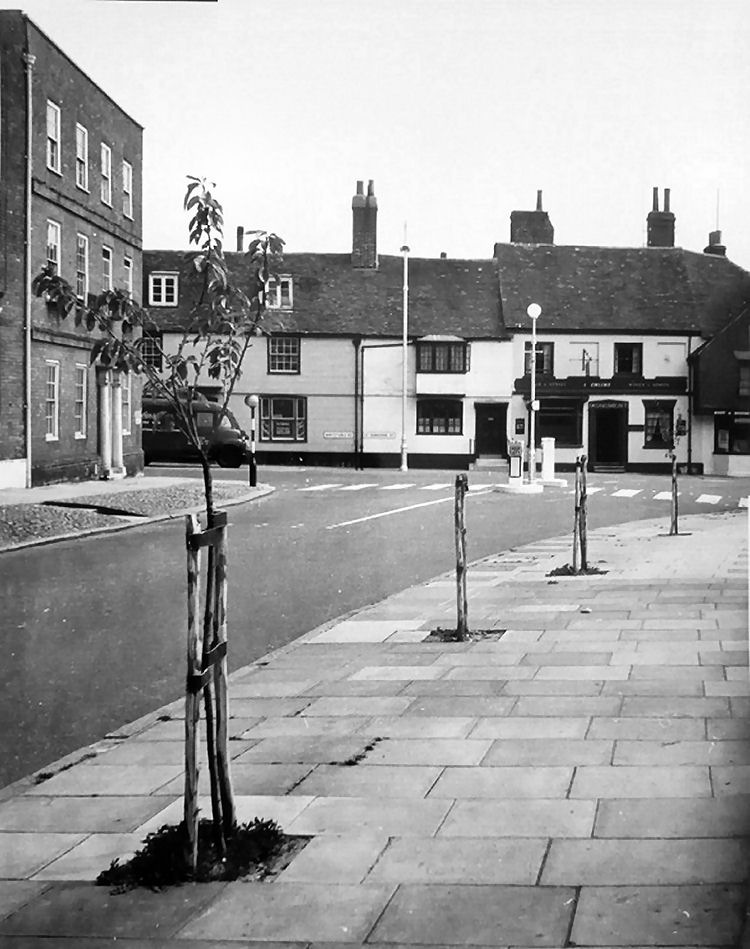
Above photo, circa 1957, kindly sent by Rory Kehoe. |
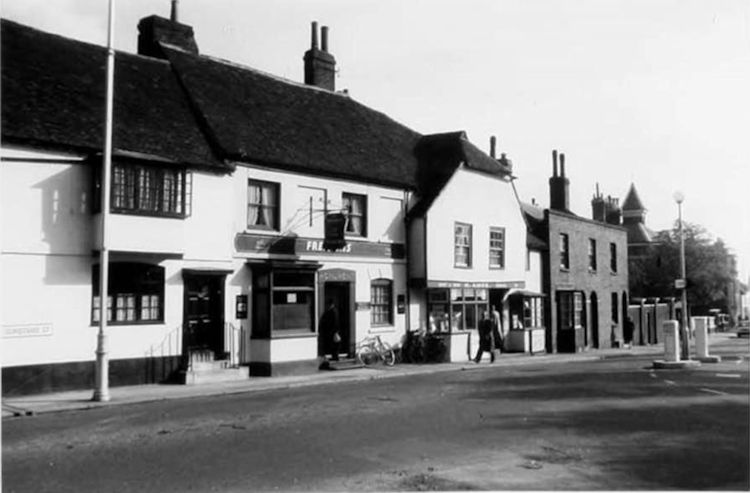
Above photo, 1960, kindly sent by Tim Timpson. |
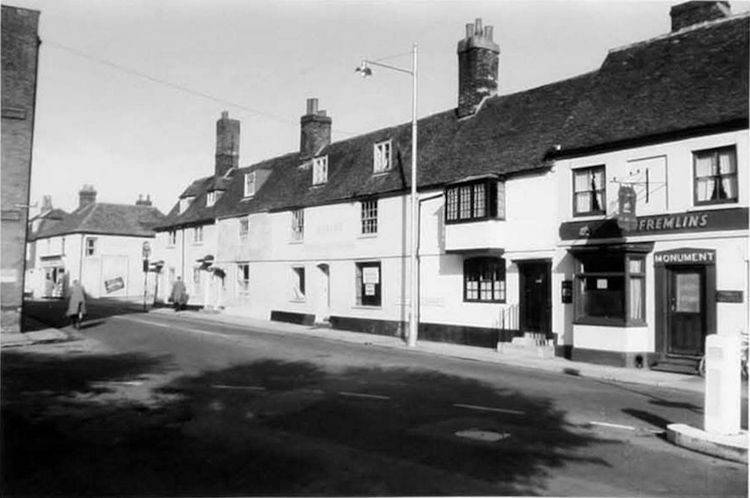
Above photo, date unknown. |
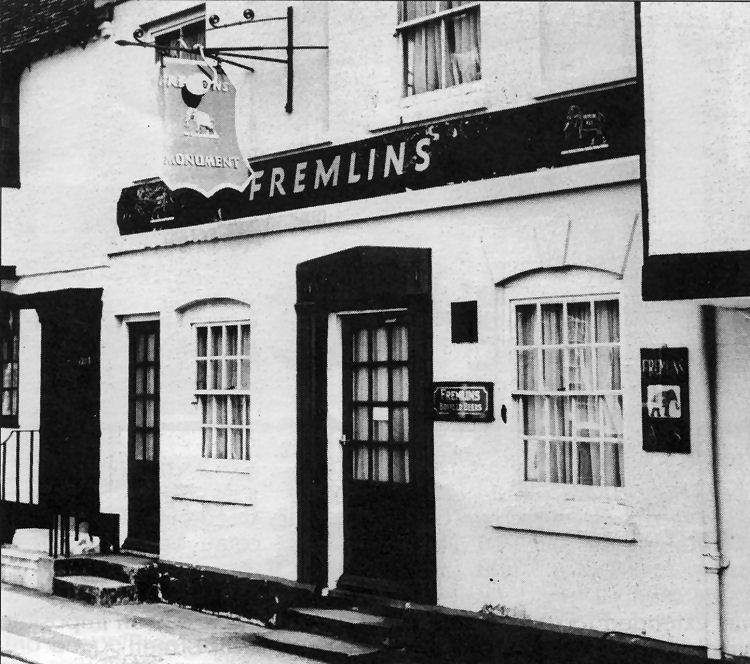
Above photograph by Edward Wilmot 1965. |
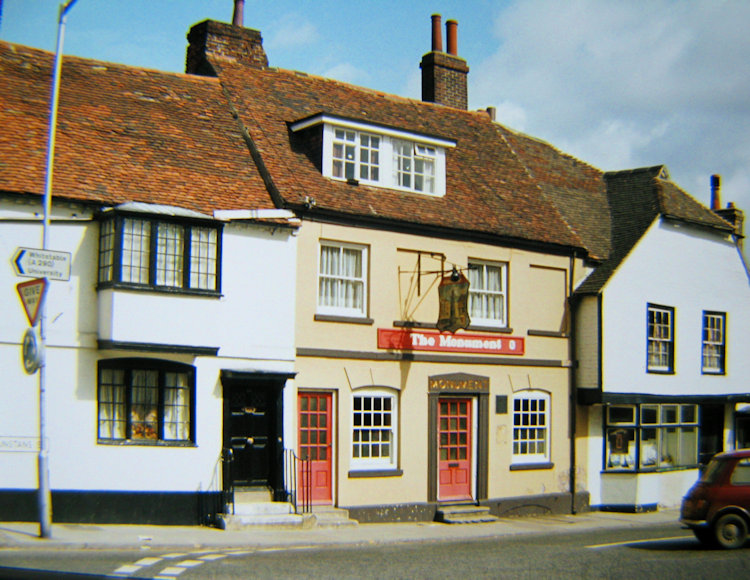
Above photo, 13 April 1982, by Jim Ashby. |
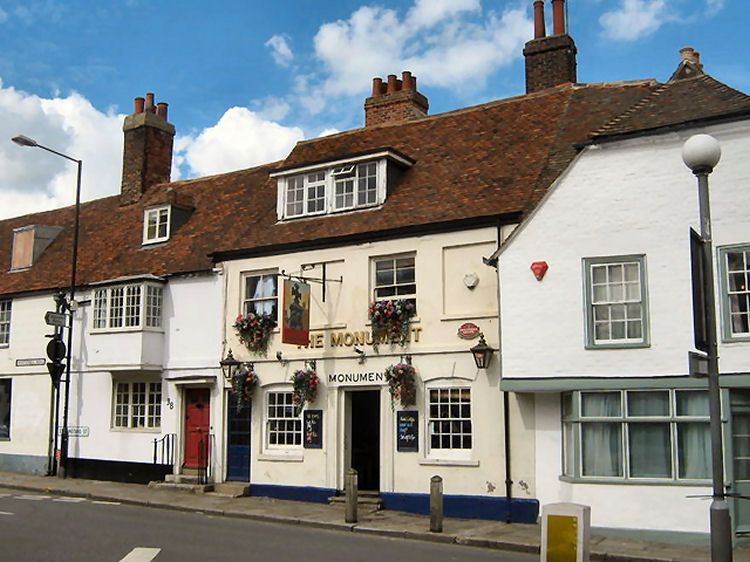
Above photo 2009 by David Anstiss
Creative Commons Licence. |
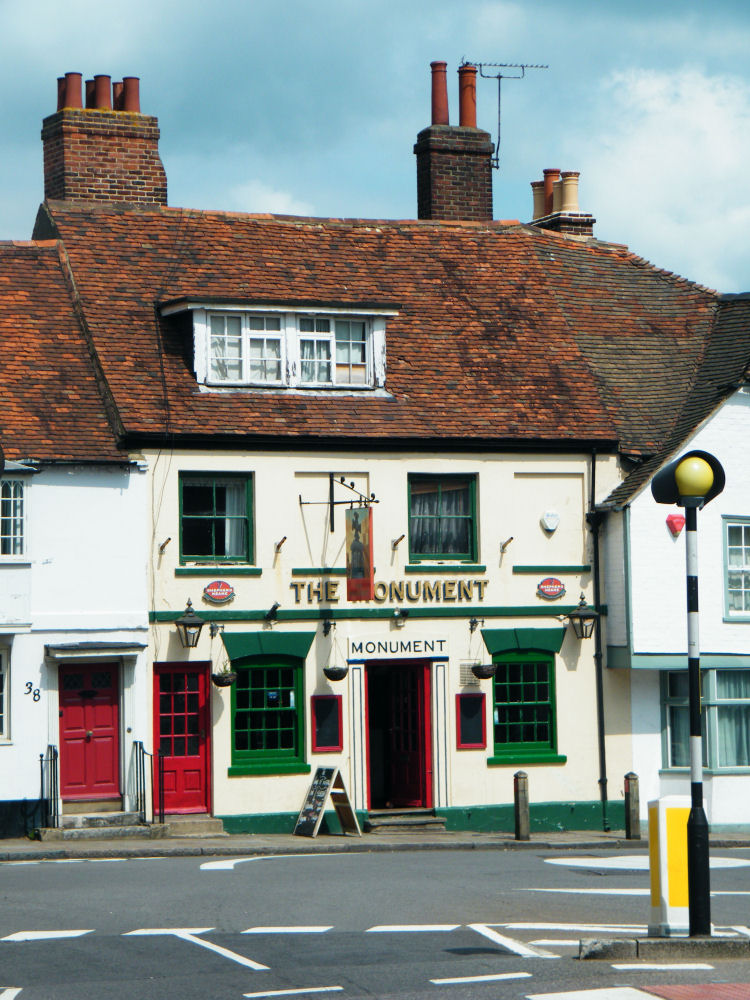 Above photos taken by Paul Skelton, 19 May 2012. |
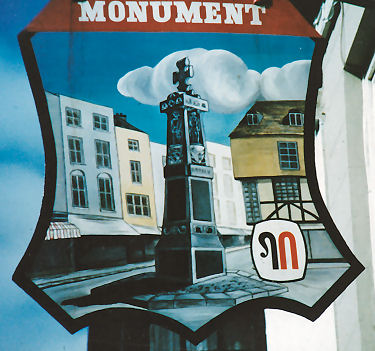 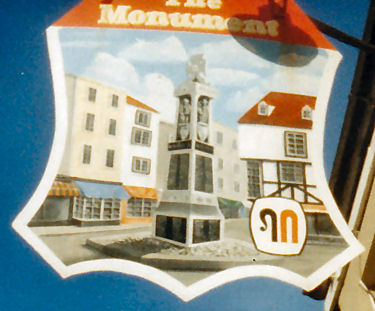
Monument sign left October 1974, sign right July 1986.
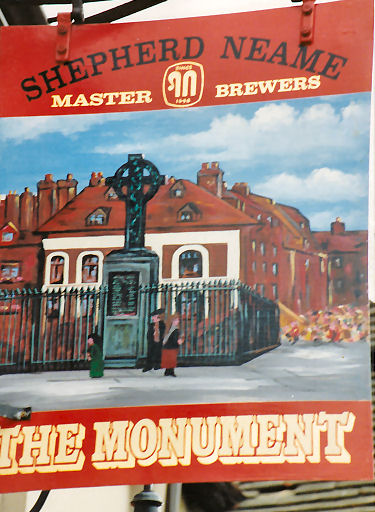 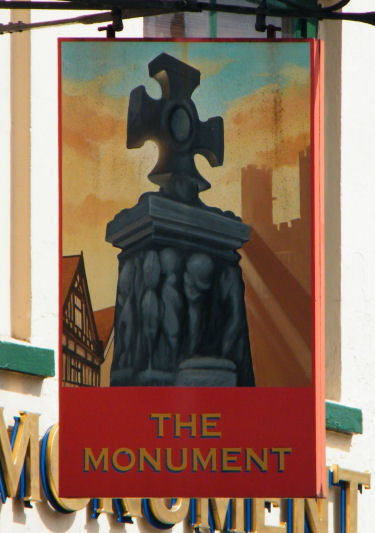
Above sign left May 1991, sign right by Paul Skelton 2012
Above with thanks from Brian Curtis
www.innsignsociety.com
|
This premises gained its name from a monument that used to stand in the
street between the inn and St. Dunstan's Church, which was in the form of a
cross. The premises can be traced back to 1803.
West Indian cricketer Bernard Julien lodged at the "Monument" whist
playing for the Kent cricket team and at the time was popular with crickets
including John Shepherd.
The sign shown from 1987 and above in 1991 for some reason represented
the war memorial in Buttermarket and not the one mentioned in the form of a
cross.
|
Kentish Gazette, 16 May, 1806.
TO BE LET.
BY Tender of Rent, on Lease, for the term of 14 years from
Michaelmas 1806.
Lot 1. All that well-established PUBLIC HOUSE, known by the sign of
the "Blue Anchor," with the buildings, yards, gardens, and
appurtenances, situate in Littlebourne street, in the county of Kent.
Lot 2. All that other well-established PUBLIC HOUSE, known by the
sign of the "King's Arms," with the buildings and appurtenances,
situate in Saint Peter's-street, in the city of Canterbury.
Lot 3. All that other well-established PUBLIC HOUSE, known by the
sign of the "Monument," with the garden and appurtenances, situate
in the parish of Saint Dunstan, in the said county of Kent.
Lot 4. All that other well-established PUBLIC HOUSE, known by the
sign of "Prince Charles," with the stable and yard, situate in the
parish of Holy Cross Westgate, in the said country of Kent.
Lot 5. All that well-established CAPITAL INN, or PUBLIC HOUSE, known
by the sign of "Sir John Falstaff," with the coach-houses, stables,
yards, gardens, and appurtenances, situate in the said parish of
Holy Cross Westgate.
All the above lots are in the occupation of Mr. John Abbott, or his
undertenants.
Tenders of rent, for either or any of the above lots, to be
delivered sealed up, on or before the 18th June next, to Mr.
Cumming, of Canterbury; of whom, in the mean time, the conditions of
letting may be seen.
|
|
From the Kentish Gazette, 14 September 1810.
DEATH.
Sunday, Mrs. Gill, wife of Mr. Charles Gill, landlord of the
"Monument" public-house. St. Dunstan's, Canterbury.
|
|
From the Kentish Gazette, 14 September 1810.
DEATH.
Sept. 9, Mrs. Gill, wife of Mr. Gill, landlord of the
"Monument" public house, St. Dunstan's, Canterbury.
|
|
Kentish Gazette, 11 July 1820.
TO BE LET,
THE INN and FOUR following PUBLIC HOUSES.
The "SIR JOHN FALSTAFF INN," and the house known as the "PRINCE
CHARLES," in the Parish of Westgate; the "MONUMENT,"
in the parish of St. Dunstan’s; and the "ANCHOR,"
in the parish of Littlebourne, in the County of Kent; and the "KING’S
ARMS," situated in the parish of St. Peter's in the City of
Canterbury.
They are Let to John Abbott, Esq., St. Dunstan's by Lease, which
will expire at Michaelmas next.
Further particulars may be known on application to Mr. GURNEY
CROASDILL, Thannington Court.
|
|
Kent Herald, 27 October 1825.
Elias Culver, Thomas Culver, William Culver, and Richard Culver, for stealing on
the 18th day of June, 1824, at the Ville of Dunkirk, 23 bundles of bark, the
property of Robert Rooke.
Mr. Bolland opened the case, and related the facts, which were afterwards
proved, and detailed in evidence. The following witnesses were then called:-
Robert Rooke examined:- Purchased a cant of wood in Blean Wood, which was felled
in March, 1821, by a man named May, who was employed in flawing it, in the month
of June following; was certain it was safe on the 18th June in the evening; on
the 19th he missed it; the spot from whence it was stolen is about 20 rods from
Dargate Common.
William Rye comer a labouring man, then deposed, that he lived on Dargate Common
in the month of June, 1824, new the cant purchased by Rooke, and also that
purchase by Culver; his Cottage was about 60 rods from Mr. Rooke's cant and 40
from culver's. Remembered the 18th June; it was star-light; heard a noise about
half past ten o'clock, as he was going home; he immediately went to the wood,
and saw the prisoners; he concealed himself behind a large oak tree, and
distinctly saw four persons go to Mr. Rooke's cant and take two bundles of bark
each; the prisoners were the men; they went twice; the second time taking two
more bundles each, making in all 16; Culver's cant was not bound; Rook's was;
saw them take the bundles and lay them near their own; he then went home, and
related to his wife what he had seen; he did not immediately speak of the
robbery to any other person, less the Culver's, if they knew he gave the
information, should do him some bodily mischief; it was some weeks afterwards,
when he told the prosecutor, at the "Monument" public house in Saint Dunstan's.
This witness was severely cross-examined by Mr. Berens. The man gave his
evidence in a very clear and distinct manner; much better, indeed, then the
generality of labourers; and there was nothing elicited which shook his evidence
in the slightest degree.
William May, a labourer, examined:- Was employed in 1824, to flaw some bark for
Mr. Rooke; the prisoner, Elias Culver, had a cant adjoining; he bound 77 bundles
of bark with whiffs which he obtained in Blean Wood; they were horse beech;
finished binding on the 18th June; saw the whole of the bark safe on the evening
at 9 o'clock; Culver's lot was not bound; after he had done work, he went to the
"Ship," at Boughton, which was about half past nine; saw the prisoners Thomas
and William there; the next morning he missed 23 bundles; saw Thomas Culver,
William Culver, and William Pettman, in Elias's cant at work binding the bark;
went to them, and asked what time they got there; prisoners said about 2
o'clock; witness then told them he had missed 23 bundles of bark; one of the
prisoners said, "The hell you have;" he then asked whether they had seen a wagon
or a cart; prisoner said no; the weight of the bark stolen might be about 700
cwt.; found the whiffs in the Wood, which were the same as he had bound Rookes
bark with.
----- Ralf, junior, worked in Blean Wood, where he found the whiff's lying
together with some leaves over them, which he took to his father; found
altogether 23 whiffs.
Thomas Ralph examined:- Deposed to having sent his son for some whiffs, who
returned with 23, which appeared to have been used.
John Coultard, landlord of the "Ship," at Boughton, proved that he's house was
empty on the night of the robbery before 11 o'clock.
The Chairman then, dwelling occasionally upon various trifling discrepancies of
evidence, which he pointed out to the Jury, left it for their consideration,
whether the prisoners were guilty of the charge alleged against them.
After a short deliberation, a verdict of Guilty was pronounced.
The prisoners with the exception of Richard Culver, were sentenced to be
transported seven years.
|
|
Kentish Gazette, 30 October 1849.
An inquest was held on Saturday last before T. T. DeLasaux, Esq., at the
"Monument" public-house, St. Dunstan’s, on the body of Thomas Harman, a
vender of sweetmeats at St. Dunstan’s. From the evidence brought forward
it appeared that deceased had been drinking freely of rum, &c , the
evening previous; he was taken home and put to bed, and on being visited
shortly afterwards it was found he had expired. Mr. Holttum, surgeon,
was called in, and found deceased had been seized with a fit, which had
in all probability been induced by his being placed in a recumbent
position while in a state of intoxication.
Verdict accordingly.
|
|
From the Kentish Chronicle, 3 December 1857.
INQUEST ON THE BODY OF JAMES COPPINS.
Rumours were current that other persons had suffered from taking
draughts purchases at Mr. Reeve's shop. In one case that of a man named
Coppins, an old man 82 years of age, who died on Sunday week - they
assumed a sufficient definite shape to render it the duty of the Coroner
to institute further inquiries. He accordingly directed the body to be
exhumed from the gave in S. Dunstan's churchyard, which wa done early on
Monday morning. A post-mortem examination was afterwards made by Mr.
Robert Tassess, and at three o'clock an inquest was held at the
"Monument," St. Dunstan's before T. T. Delasaux, coroner for the
district, and a respectable jury.
The Coroner said, there were no doubts aware on whose body they were
about to hold the inquest, and that the circumstances of the inquiry
were somewhat universal. The deceased was buried on Sunday week. Since
then, however, a complaint had been made to him by a parishioner named
White, to the effect that there was reason to believe that the deceased
did not come to a natural but violent death. He requested the jury to
give a dispassionate attention to the evidence to be brought before
them.
The jury then viewed the body and the following evidence was taken.
Elizabeth Coppins, the widow of the deceased, deposed:- I live in the
parish of St. Dunstan. The deceased was my husband and 82 years of age.
He has been ill and has done no work for two months past. His death took
place at about one o'clock in the afternoon of the 15th inst, in the
parish of St. Dunstan. He had only been a little poorly before his
death. On Monday night, the 14th inst., between seven and eight o'clock,
I went to the shop of Mr. John Reeve, chemist, in St. Peter's Street,
and asked him for a blue pill and black draught. I gave the pill to my
husband overnight (Tuesday) I gave the draught to him, and he drank it
from a glass in my presence. About an hour after he had taken the
draught he seemed as if he could not walk. No other change took place
till we got him into bed, assisted by Mr. Waite and my daughter. Then he
turned very pale, and about two hours before he died he became very
drowsy. He died in that state about one o'clock. I fetched the medicine
in a vial. The one now produced is the same. It was a vial of my own
which I had in the house. It was filled in the shop, nearly half full,
from a small vial. I saw Mr. Reeve but he did not serve me. He told a
lad in the shop to serve me and he did so. I did not have any medicine
there before during my husband's illness.
By the Jury:- My husband had no medical attendance during his illness.
[The medical certificate signed by Mr. Charles Holttum, was put in. It
attributed the death to chronic bronchitis.]
A Juror:- Is it usual for a medical man to give a certificate of death
without having attended the deceased?
Mrs. Coppins said, in answer to another of the jury, that Mr. Holttum
had attended her husband, but she could not say how long it was since he
had done so.
By the Coroner:- My husband was a member of the Black Dog Club, of which
Mr. Holttum is surgeon.
Nathaniel Waite:- I have known the deceased forty years. I frequently
saw him. On Monday, the 14th December, I saw the deceased walking in St.
Dunstan's Street at about three o'clock. The next morning at about a
quarter to nine, I was called in by Mrs. Coppins. I went into the house
and up-stairs, where I saw the deceased. I saw a great change in his
appearance from Monday. He appeared to be in a fit. I advised Mrs.
Coppins to get him into bed. He stared very much, and seemed stupefied.
I spoke to him and he did not answer me. Mrs. Coppins spoke to him, and
he made noise, as though he had heard me, and was not quite insensible.
Inspector Spratt here produced a full vial (the same that he purchased
at Mr. Reeve's shop) and Mrs. Coppins being re-called, said that the
bottle from which Mr. Reeve had poured the draught into her vial was
similar to the one now produced by Spratt.
Inspector Spratt:- On Saturday last, the 26th, between two and three
o'clock, I went to the house of deceased, and received from the last
witness the empty vial produced, which she said was the one which
contained the draught taken by the deceased.
Mr. Robert Tassell:- I am a surgeon. I made a post-mortem examination
this day on the body of the deceased. The external appearance of the
body showed no decomposition or any emaciation, but was to all
appearance healthy. On removing the cranium the vessels of the brain
were considerably congested, and very soft and friable. On examination
of the heart it presented a fatty appearance, and was rather enlarged.
The valves of the heart were healthy, with the exception of the aortic
valve. The lungs were congested and the tubes more or less filled with
mucous. The liver was congested, but otherwise healthy. The stomach
contained about two ounces of thick brown fluid. I did not examine it
minutely, because I thought further examination necessary. I should not
like to give an opinion as to the cause of death. I cannot do so till
the contents of the stomach have been analysed. There was about 1 1/2
oz. of fluid in the brain which was quite enough to to cause death, but
I cannot say what produced the congestion. I think that the congestion
of the various organs of the body would tend to produce death, but I
should not anticipate a crisis coming on so suddenly without some
exciting cause.
The coroner said that under the circumstances the inquiry had better be
adjourned till the following evening, to which the jury assented.
ADJOURNED INQUEST.
The jury re-assembled at eight o'clock, when the following additional
evidence was taken:-
Mr. Tassell:- I should like to have Mrs. Coppins present, and examine
her myself as to the symptoms her husband showed before death. It would
assist me materially i forming my conclusion as to the cause of death.
When a person has been taken out of his grave and a medical man has to
give his opinion as to the cause of death, he naturally labours under a
great difficulty, at least, unless he can ascertain some of the symptoms
which preceded death.
The Coroner:- You cannot question Mrs. Coppins but I will read over the
evidence she gave yesterday in which she described many of the symptoms
of the deceased. (The Coroner then read over the evidence.)
A Juror:- There is a discrepancy between the evidence of Mrs. Coppins
and that of Waite. She says that he waited to assist the deceased into
bed; but he stated that he did not do so. Besides, I know that this man
walked with great difficulty before; so that it may naturally be
supposed that he could not walk well on the morning in question.
Mr. Tassell:- I only wished to ask Mrs. Coppins whether the deceased on
the morning of his death became gradually drowsy, or whether he went
off in a fit with screaming, or any noise?
The Coroner:- I think you may be sure that he went off gradually, for
Mrs. Coppins said nothing about screaming or any noise having been made
by the deceased.
Mr. J. Tassell then said, as evidence - I took the stomach of the
deceased and put it into a jar, together with a portion of the small
intestines, previously tying up the ends of the stomach. I sealed the
jar and gave it into the hands of Inspector Spratt. I was present at the
shop of Mr. Linford when the seal was broken - indeed, I broke it
myself. That was of the evening of yesterday.
Mr. J. S. Linford said:- Yesterday I received from Inspector Spratt a
jar containing the stomach of the deceased. It was opened in the
presence of the last witness. It contained a stomach and the small
intestines. Mr. Tassell assisted me to cut the stomach open, empty the
contents (about 1 1/2 ox. of brown thick fluid), and scrape the inner
coat, that we might have the whole of the contents. I washed the inner
coat of the stomach with distilled waters. I examined the fluid and
detected in it traces of meconic acid, the constituent which proves the
presence of opium. I could not have discovered opium by itself. Opium is
discovered and proved by the presence of its two constituents - meconic
acid and morphine. I cannot positively say that the bottle produced (the
one from which the deceased took his draught) has contained opium; but
it is my firm opinion that it has. I took one drop of the mixture
remaining in that bottle, and having subjected it to proper test, there
resulted the usual sign of the presence of meconic acid, I can say
positively that the stomach of the deceased contained opium (the
presence of the meconic acid proves it. I cannot say what quantity, or
whether enough to have caused death, because I only examined a very
small quantity of the contents of the stomach. Morphia - the constituent
which shows the presence of opium - is very readily absorbed in the
system, and is very seldom found in the body after death.
Mr. Tassel was then re-examined, and said:- Having heard the evidence of
Mr. Linford concerning the contents of the stomach, I can say the
immediate cause of death was the fluid in the brain, and that this might
have resulted either from apoplexy, or from poisoning by opium; because
it has not been ascertained what quantity of the opium was in the
stomach. Supposing that poison had been taken, it might have been so
absorbed in the system to cause death; but old age is also a very liable
to serious apoplexy. The body was in a healthy condition.
By the Jury:- A dose of opium would probably produce quicker effect upon
an old man than a young one. If the stomach were empty at the time the
poison was taken it would be more rapidly absorbed into the system, and
less of it be found in the stomach. There has been no proof of the
quantity of opium found in the stomach.
The Coroner then summed up the evidence. You have now, gentlemen, he
said, the whole of the testimony before you. It is quite clear that
something was taken by the deceased shortly before his death; and that
the medicine, whichever it was, was obtained from the shop of Mr. Reeve.
It will be your duty to say from the evidence whether, supposing the
deceased took that medicine, it caused his death. From the last sentence
the surgeon said, he clearly throws considerable doubt on the point;
because he tells us that the deceased died from one of two causes -
serious apoplexy, or poisoning by opium. I entreat the jury to pause
before by their verdict they incarcerate a person within the walls of a
gaol on the charge of having committed a most serious offence, unless
they believe that upon the subsequent trial which must take place a
conviction will be obtained.
The Jury then consulted alone for about five minutes, and upon the
re-admittance of the public they said it was their unanimous opinion
that the death of the deceased was a natural one. They therefore
returned a verdict to that effect.
|
|
South Eastern Gazette, 21 February, 1860.
Highway Robbery by Soldiers.
At the Friday’s sitting of the city justices, three privates of the
90th regt., named respectively John Hilton, William Smith, and John
Wayland were charged with having committed a highway robbery on the
person of Robert Davison, of Cross-street, St. Dunstan’s.
Prosecutor deposed that about 20 minutes before 12 on Wednesday
night he was returning from the "Monument," in St. Dunstan’s-street,
and had reached the corner of the street in which he resided, when
the prisoner Smith seized him by the throat, threw him on the
ground, and held him tightly down. The other prisoners then searched
his pockets, but not finding any money, they took off his boots, and
his pocket handkerchief from his pocket, and then ran away, He could
not call for assistance, as he was held so tightly. He identified
Smith, but could not speak positively to the other two men. He also
identified the boots produced as his property. The landlady of the
"Builders Arms," Cross-street, spoke to the three prisoners leaving
the house about half-past 9 on Wednesday night, and returning about
10 the next morning, P.C. Towler saw the prisoners in the
High-street at 12 o’clock on Wednesday night, and one of them
remarked, "Look out, and you will have us before morning." Henry May
spoke to seeing Smith and Hilton going down North-lane on Thursday
morning, and a short distance further on he found the boots
produced.
Prisoners pleaded their ignorance of the robbery, and asserted that
they had never seen the prosecutor before.
They were committed for trial.
|
|
From the Canterbury Weekly Journal, 11 April 1863.
Thursday. [Before the Mayor, Alderman Philpott, and W. H. Trimnell, Esq.]
Transfer of Licenses.
The licence of the "Monument" public house was transferred from Isaac Dawson to
Henry Brenchley.
|
|
From the Kentish Gazette, 21 March 1865.
Transfer of Public House Licenses.
At the Petty Petty Sessions, on Thursday, the license of the
"Monument," St. Dunstan’s, was transferred from Mrs. Harriot
Brenchley, to Mr. Stephen Godden.
|
|
From the Kentish Gazette, 9 May 1865.
Transfer of Licence.
A special Petty Sessions, for the transfer of public house
licenses, was held, at the Guildhall, on Thursday, before the Right
Worshipful the Mayor (Peter Marten, Esq.), Alderman Philpott and Wm.
Plummer, Esq.
Licenses were transferred as follow:—
"Monument," St. Dunstan’s, from Harriet Brenchley to Stephen
Godden."
|
|
Canterbury Journal, Kentish Times and Farmers' Gazette 13 March 1886.
THE WATER ANALYSIS.
A report of an analysis of a sample of water, which was condemned,
having been read,
Mr. Allen moved that the sample be analysed by an independent analyst.
Mr. Wells said the Medical Officer had stated in court that 30 grains
was not unsafe for drinking purposes, while a sample from the pump at
the Union which had 30 grains was condemned.
Mr. Wells referred to the
result of the analysis of the water at Mr. Flint's brewery and the
"Monument Inn," St. Dunstan's, as unsatisfactory.
The Town Clerk:— Then you say that to do my father a turn the City
Analyst gave an improper report of the water.
Mr. Allen:— The analysis at St. Dunstan's has given, great
dissatisfaction in that neighbourhood.
The Town Clerk having made some remarks Mr. Wells said he was only
speaking words with no sense in them.
The Town Clerk:— I am not a professional man.
Mr. Wells:— Then you should not give an opinion.
Captain Lambert protested against Mr. Wells conduct. He said if they
carried out what was proposed there was no use having an analyst, and
they would have to change their Medical Officer, Surveyor and other
officials.
Mr. Wells said he should do what he liked as long as he was in the
Council.
Alderman Hart:— We cannot tolerate such conduct.
Mr. Wells said he could not help it, he was very cross over the matter.
Mr. Cross suggested that a duplicate sample should be taken and handed
to the householder to have analysed if he wished.
It was understood that this in future would be done. Mr. Allen's
proposition had no seconder, therefore the matter dropped.
|
|
From the Whitstable Times and Herne Bay Herald. 16 February 1901. Price 1d.
ALLEGED THEFT FROM A TILL.
Edward Corbett was charged with stealing 11s. 6d. from the till of the
“Monument Inn,” St. Dunstan's Street, on the previous day. Emma Solly, wife of the landlord, deposed that prisoner came to the
house about 4 o'clock on the previous day. She served him with a pint of
beer for which he paid 2d., and left him sitting in the bar for about
ten minutes. Whilst in her sitting room she heard the money drawer in
the bar close and just as she entered she saw prisoner standing outside
the bar in the act of closing the flap of the counter. She at once went
to the till and found only sixpence left. She said to prisoner “You
wicked man you have robbed my till.” He made no reply, and after a few
seconds he handed her 11s. 6d. in silver, he then left the house. She
subsequently gave information to the police.
P.C. Gilham deposed that at ten minutes to twelve the previous evening
he apprehended the prisoner in St. Dunstane and took him to the police
station where he was identified by prosecutrix. Witness charged him with
stealing 11s. 6d. from the till of the “Monument Inn.” He said “How
could I have stolen it when I handed it to her back.” Prisoner, who seemed very strange in his manner, refused to say whether
he would go for trial or be tried by the Magistrates. He stated that he had been in Chartham Asylum and thought he ought to
put away again. The Superintendent applied for a remand until Friday and the bench
granted the application. |
|
From the
https://www.kentonline.co.uk By Gerry Warren, 26 November 2019.
Kent's first 100% vegan pub The Monument in Canterbury shuts.
The licensees of Kent's only vegan pub have called time on the business
after reporting a "quiet summer".
Tom Boughton and Jo Brookman had been running the 19th century Monument
in St Dunstan's, Canterbury, which won acclaim for its completely
vegan-only menu.
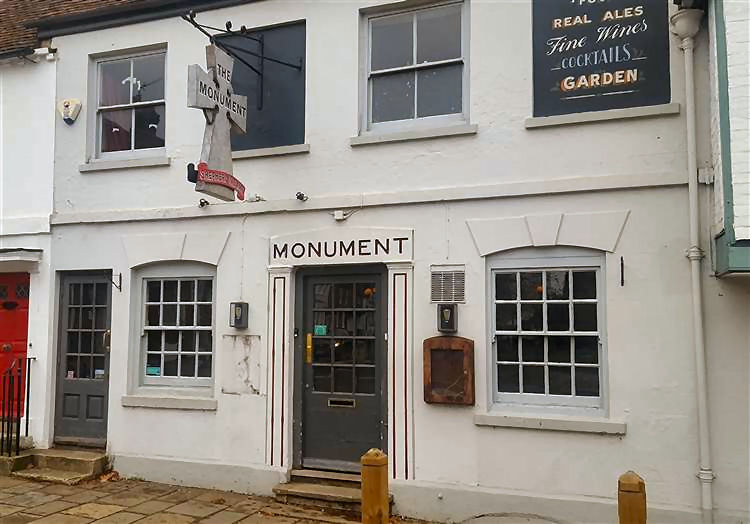
The Monument in St Dunstan's could re-open
They had hoped the growing appeal of veganism would entice more
customers.
But the couple have handed in their notice to owners Shepherd Neame and
posted on the pub's Facebook page that after "difficult deliberations",
they have left to pursue "fantastic personal opportunities".
Now Shepherd Neame says the pub no longer fits in with its current
business strategy and the company plans to put it up for sale as a going
concern in January.
In their Facebook post Tom and Jo said they spent the last
two-and-a-half years "putting our love, energy and enthusiasm into our
tiny pub to create a truly magical vegan enterprise within the city of
Canterbury and we’ve enjoyed every minute."
But the couple had suggested that trading was tough in an earlier
Facebook post in September, writing: "Many small businesses in
Canterbury don’t have the luxury of being on well-trodden tourist
routes, and like them, we’ve had a quiet summer because of that.

Tom Boughton and Jo Brookman have left the Monument pub.
"We do still actively need the support of our local and vegan community
otherwise independent businesses like us simply disappear overnight.
"With pubs going bust at a rate of 18 per week in the UK, if you want to
see us stick around, much like other dietary specific businesses, you
need to come and make the most of us."
The couple held a closing down party on Saturday, November 16, and Jo
has announced that she has trained to become a personal fitness coach,
also specialising in pole dancing fitness.
A Shepherd Neame spokesman said: “We can confirm that The Monument in
Canterbury is currently closed, and will re-open in December under a
temporary agreement.
"After careful consideration, the brewery has decided that the pub will
go on sale in January, and will be sold as a going concern.
"It was not a decision taken lightly, but the pub does not fit with our
current business strategy."
|
|
From an email received 7 July 2020.
Hi there, I’m sorting my Dad’s estate here in NZ, and came across
this tankard - pictures below. I think it may have been something my
grandfather, born 1890 in Guilford I think, collected in his travels. He
lived in NZ from 1910 onward. The engraving appears cut by an electric
tool, not cast. A quick google showed this: [British Pub Pewter Pint
Tankard. Verification mark: crown - VR - 30 (Victoria Regina,
Middlesex), 1870s.]. So, it may have some age and significance to the
"Monument," or it could be a 70’s tourist piece. I hope it’s of some
curiosity, at least.
Best wishes, Howard Vickridge.
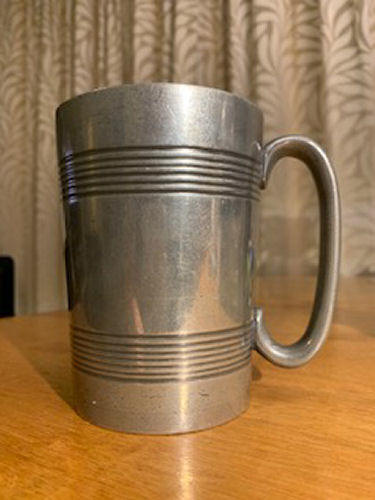 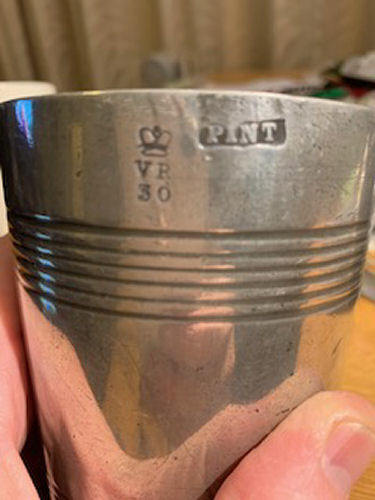
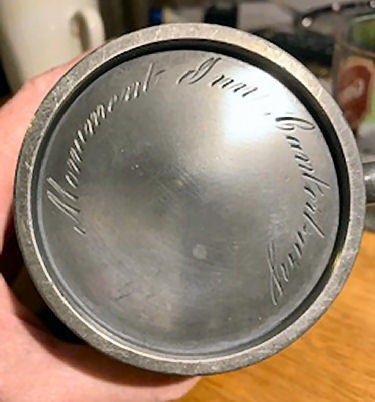 |
|
From the
https://www.kentonline.co.uk By Lydia Chantler-Hicks, 1 April 2021.
Canterbury pub bought from Shepherd Neame by former poker star Sam Holden.
A former international poker star has bought a long-vacant city pub -
where he plans to work behind the bar.
Sam Holden - who rose to fame after winning almost $1 million on the
world poker stage - has traded in the baize for the beers after snapping
up The Monument in St Dunstans, Canterbury.
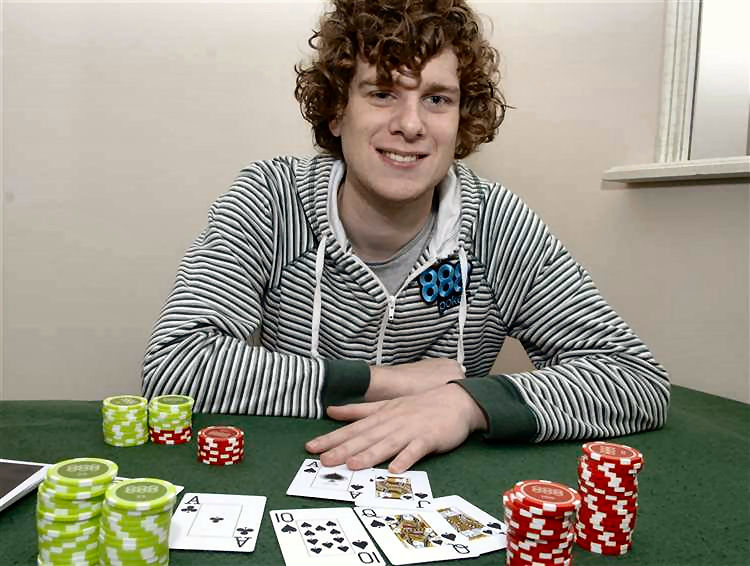
Sam Holden, pictured in 2011 when he made the finals of the World Series
of Poker tournament in Las Vegas. Picture: Chris Davey.
The Grade II-listed boozer, dating back to the early 1800s, has been
sold off by brewing giant Shepherd Neame.
It was previously Kent's only vegan pub, boasting an entirely
plant-based menu. But it closed at the start of last year after
licensees reported a "quiet summer", and has since lain derelict.
Mr Holden now hopes to breathe fresh life into the premises, as he
prepares to reopen it in June as an independent establishment.
He first moved to Canterbury as a student when he was 18, and it was
while studying forensic science at the University of Kent (UKC) that he
began playing poker.
He found fame at 22, when he made it to the final table of the World
Series of Poker tournament in Las Vegas just a year after turning
professional.
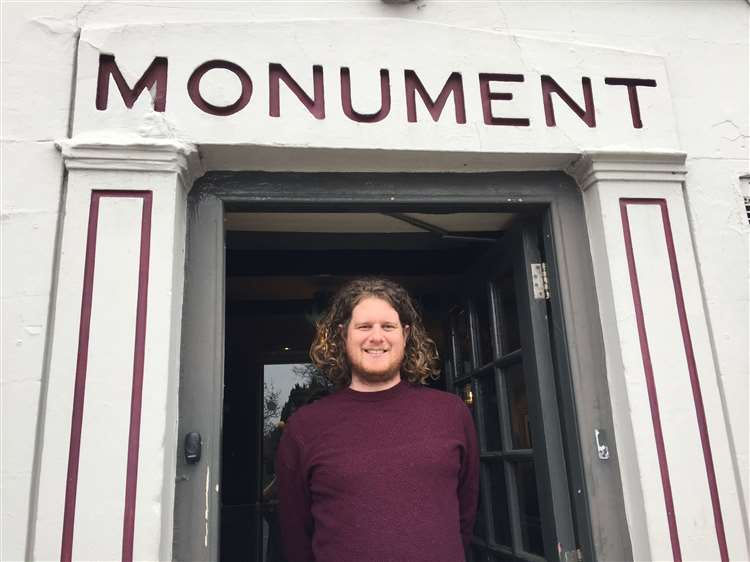
am Holden is looking forward to reopening The Monument.
He finished 9th, scooping an incredible $782,115, and later that year
bagged $150,000 by winning a poker tournament in Cardiff.
The following year he returned to Vegas, finishing 55th in the world
series event, earning a cool $128,384.
His success allowed him to enjoy four years travelling the globe,
representing 888 Poker on the world stage.
"It was very good for me," he told KentOnline.
"I was doing a lot of travelling in those four years, and it was a
really fun experience.
"But after that I was ready to move on and try different things - I
didn't want to play poker for the rest of my life."
In 2014, Mr Holden returned to education, studying a second degree in
philosophy at UKC.
Now 31 and "semi-retired" from the world of poker, he has set his sights
on his next adventure - running a pub.
Mr Holden and his family have a long history of working in the
hospitality industry, and he describes himself as passionate about
British pubs and real ale.
Having bought The Monument, he hopes to carry out refurbishments on the
premises before reopening in June.
“Having been looking for my next project for some time, I am delighted,"
he said.
"It's going to be a traditional pub but it's going to be a little bit
quirky.
"The beauty is it's going to be completely independent, so it's going to
be something a little bit different. I think it's going to be a cosy pub
with a lot of character."
Mr Holden says the pub will offer a wide selection of "high-quality food
and drink at a reasonable price".
"We've got a lovely garden here too, so hopefully we'll be able to make
the most of the good weather when it comes," he added.
"I'm really passionate about Canterbury. I moved away for a couple of
years and realised how much I loved it, which is why I moved back.
"So I really want this pub to be part of the community - for locals as
well as people passing through.
"I'm really looking forward to inviting everyone, come the summer."
Having lived in Roper Road for eight years, Mr Holden has now moved into
a five-bedroom owner's flat above the pub.
He says he plans to be behind the bar once it opens, offering punters a
"warm welcome".
The pub was sold on a freehold basis, off a guide price of £360,000, by
specialist business property adviser, Christie & Co.
A Shepherd Neame spokesman said: “Shepherd Neame put The Monument on the
market in January 2020, before the pandemic began, to be sold as a going
concern.
"It was not a decision taken lightly, but the pub did not fit with our
business strategy. We currently have no plans to dispose of any other
pubs in Canterbury or the surrounding area.” |
LICENSEE LIST
RYE Mrs 1803+

GILL Charles 1810+
FINN John 1824+

GILBERT William 1832+

PETTS Edward 1838-46+ (age 60 in 1841 ) )
  
HUNTER John 1847-51+ (age 34 in 1851 ) )

DAWES/DAWSON I 1862-Apr/63

BRENCHLEY Henry Apr/1863+
BRENCHLEY Harriet to May/1865
GODDING Stephen May/1865-68+

GODDEN Mrs Jane 1874-82+
(age 60 in 1881 ) )
 
GOLDSACK Alfred 1889-91+ (age 43 in 1891 ) )
 
SOLLY Albert 1901-03+ (age 45 in 1901 ) )
  
MAXTED W 1913+

HODGES G W 1917-30+
  
WENHAM George 1938+

COLLINS Mr Tony & Mrs Oct/1969-87

???? Bob & Irene ????
BOUGHTON
Tom & BROOKMAN Jo May/2017-Nov 2019
https://pubwiki.co.uk/Monument.shtml
 From the Pigot's Directory 1824 From the Pigot's Directory 1824
 From the Pigot's Directory 1832-33-34 From the Pigot's Directory 1832-33-34
 From the Pigot's Directory 1840 From the Pigot's Directory 1840
 From Bagshaw Directory 1847 From Bagshaw Directory 1847
 From the Post Office Directory 1862 From the Post Office Directory 1862
 From the Post Office Directory 1874 From the Post Office Directory 1874
 Greens
Canterbury Directory 1868 Greens
Canterbury Directory 1868
 Census Census
 From the Post Office Directory 1882 From the Post Office Directory 1882
 From the Post Office Directory 1891 From the Post Office Directory 1891
 From the Post Office Directory 1903 From the Post Office Directory 1903
 From the Kelly's Directory 1903 From the Kelly's Directory 1903
 From the Post Office Directory 1913 From the Post Office Directory 1913
 From the Post Office Directory 1922 From the Post Office Directory 1922
 From the Post Office Directory 1930 From the Post Office Directory 1930
 From the Post Office Directory 1938 From the Post Office Directory 1938
 Inns of Canterbury
by Edward Wilmot, 1988 Inns of Canterbury
by Edward Wilmot, 1988
 Historic
Canterbury web site www.machadoink.com Historic
Canterbury web site www.machadoink.com
 Whitstable Times
and Herne Bay Herald Whitstable Times
and Herne Bay Herald
|

















